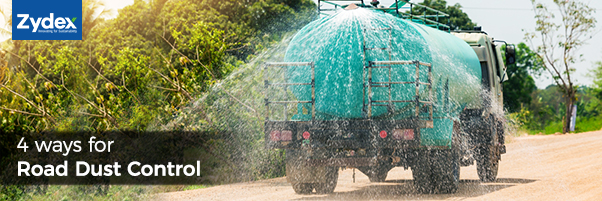Paved roads are preferred because of its numerous benefits such as smoother rides and longer life. However, converting an unpaved road to a paved road involves huge costs, due to which efforts are made to maintain the condition of the unpaved roads, especially in areas with low traffic.
The unpaved roads (or Gravel Roads) cause air pollution and significant dust generation which hampers the quality of plant and human life in the region. Dust settlement on plants refracts the sunlight and reduces the efficiency of photosynthesis, causing growth inhibition. It also causes breathing and related troubles in humans. Also, dusty roads can cause damage to vehicles and dusty driveways will cause vehicles to require more frequent car-washings at the very least. So it is essential to reduce the dust generation by bonding them in place with the road surface.
Traditionally, spraying water on the surface periodically was considered to be a good solution for dust mitigation. However, in areas with dry climate, it will only be a temporary solution. Applying a salt solution offers another way. It captures the water from the atmosphere, keeps the road top surface damp and prevents it from turning into dust.
One widely accepted practice is to use Gravel. However, it may not be a long term solution as it needs to be anchored to the road below, causing a rough ride.
Chemical technologies such as Zycobond offer a more permanent solution for dust suppression. It facilitates strong chemical bonding between the soil particles and prevents captures existing & new fines, thereby reducing the number of watering cycles.







